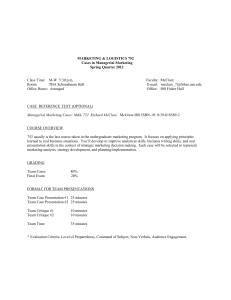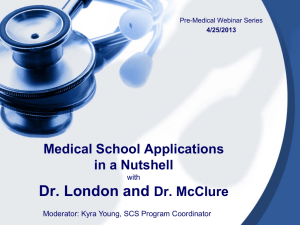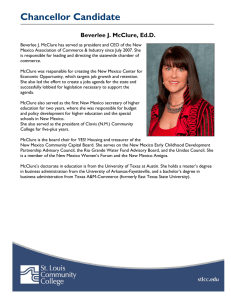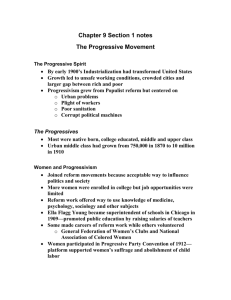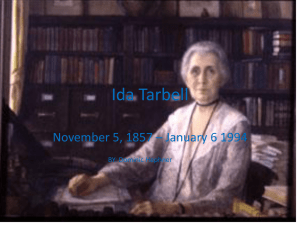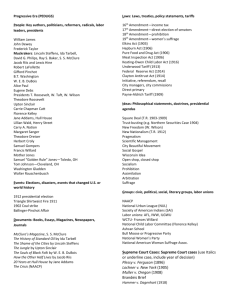2 Technical Digest APL
advertisement
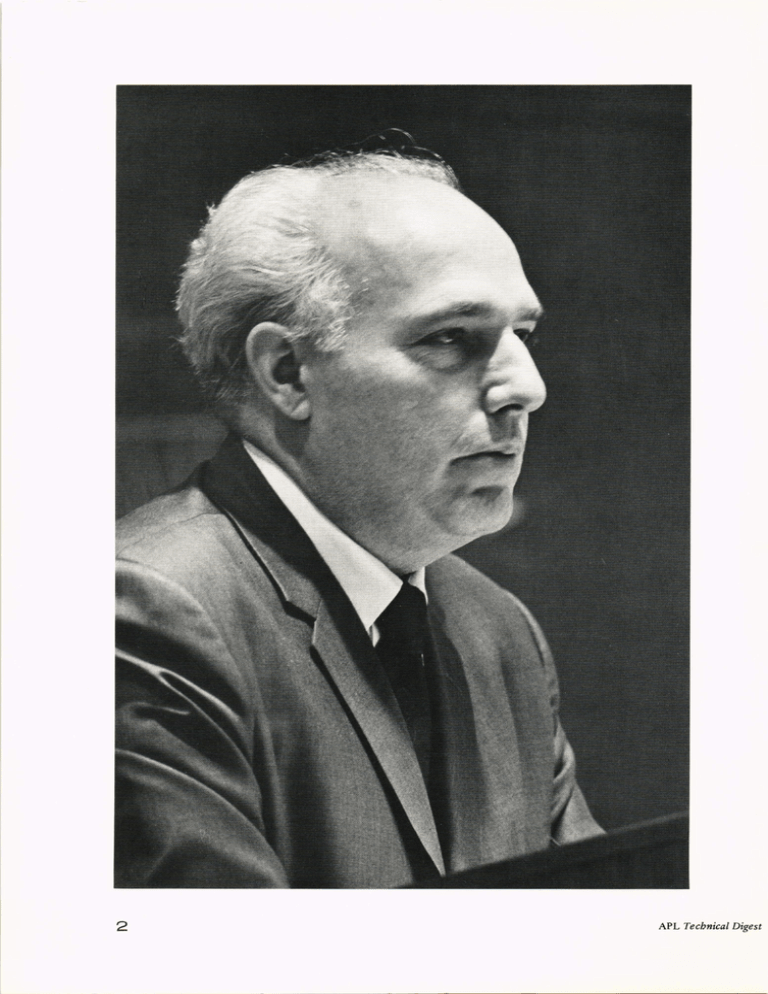
2 APL Technical Digest Frank Trelford McClure 1916 - 1973 This issue of the Digest is dedicated to the memory of Frank McClure, whose untimely death on October 18th, 1973 bereft the Laboratory of an outstanding leader, his adopted country of a scientist of great wisdom and sensitivity to human needs and aspirations, and the world of a catholic genius, whose comprehensive mind, intense and incisive thinking left its mark on every subject he discussed. Assembled here are a number of McClure's unpublished lectures which, together with a list of his published papers, reflect the scope of his genius and the integrity of his approach to questions arising in any sphere of human activity. Frank McClure was born on August 21, 1916, in Edmonton, Alberta, a province town which was then emerging from a pioneering youth to a mature metropolitan sophistication. In this atmosphere, the young McClure acquired an invigorating and disciplined outlook on life which never left him. At school he developed habits of exact and consistent thinking and a capacity to absorb, digest, and retain in his mind a store of knowledge on a wide variety of subjects. At age 21, he received the degree of B.Sc. with first class honors in Organic Chemistry from the University of Alberta, and proceeded to the University of Wisconsin, where he came under the stimulating and kindly influence of Professor Joseph O. Hirschfelder who was addressing himself to some of the tougher problems in the physical chemistry of gases and liquids. McClure proved to be an apt but exacting student and a lifelong friendship based on mutual affection and respect grew up between pupil and master. In 1939 an event took place which introduced another powerful and lasting influence on the life of the young McClure, namely his marriage to Mary Soffa, who shared with him the austere years of a graduate student and provided a home in which he always found solace from the fevers of a busy and sometimes turbulent professional life. After graduating from Wisconsin with the degree, Doctor of Philosophy in Physical Chemistry, Mac embarked on an academic career as Instructor in Physical Chemistry at the University of RochesVolum e 13, Number 4 ter. Here his talent for innovation showed itself in a rigorous course of thermodynamics which scarcely pleased the students looking for an easy approach to professional life, but appealed strongly to those who took their education seriously. His stay in purely academic life was, however, short, for after a year he left the university to respond to the call of his adopted country for help in a gigantic scientific and engineering effort to make its defense adequate to the demands of a global war, defenses which had reached a low ebb in 1939 after years of apathy and neglect. Even while at Rochester, McClure had been devoting time to defense work, collaborating with Hirschfelder in studying the thermodynamics of propellant gases, studies which were fundamental to the foundation of the internal ballistics of guns and especially rockets. In 1943 he came to Washington to be a member of the staff of the Allegany Ballistics Laboratory, and later to take over as Chief of the Ballistic Design Section. Early in 1945, he was chosen by the Office of Scientific Research and Development to undertake a scientific mission to Pearl Harbor as a representative of the Army. By this experience, he acquired a first hand knowledge of practical military problems. For his work during World War II, he was given the Naval Ordnance Development Award in 1945 and the Presidential Certificate of Merit in 1948. In his work at Allegany Ballistics Laboratory, Dr. McClure had acquired a deep insight into the physical and chemical problems inherent in the combustion of propellants in rockets. Hence, when he joined the staff of the Applied Physics Laboratory in 1946, he continued these studies in the larger context of the development of supersonic guided missiles for the modernization of the capability of Naval ships to defend themselves against attack by modern aircraft, a technology then in its infancy. For many years the search for an understanding of the complicated combustion processes in large scale solid fuel rockets continued to be one of his major scientific interests. In pursuing this objective, he inspired the collaboration of a variety of theoretical and practical investigators 3 not only in the Laboratory but also in government and industrial organizations. With the strong support of Commander, now Admiral, Levering Smith, he organized a Panel on Combustion and Instability ot Solid Propellants, and his stimulating leadership and inspired insight accounted to a major extent for the success of the Panel's investigations. Its scientific output is represented by some 100 papers published between 1957 and 1964, 26 of which were authored or co-authored by Dr. McClure. Its engineering output made available to engineers methods for designing with confidence large as well as small solid propellant rocket motors. To quote Admiral Smith, "As a result, incalculable savings have been realized in the Polaris, Poseidon, and Minuteman programs, and at the same time a very high reliability of rocket motors has been achieved." The general nature of his studies of rocket propellant problems illuminates the intellectual interests and qualities of the man himself, interests which are reflected in his approach to problems in other fields of science. In the first place, the problems were difficult and complicated (Mac had no interest in "pot boiling" research publications) and really required Promethean insight to discern a consistent and valid thread of simplification that ran through the complexities. Finding this thread provided him with intense satisfaction. In the second place, the studies were interdisciplinary, understanding of combustion instability in rockets demanded inputs from the whole spectrum from organic chemistry to advanced acoustics, from chemical kinetics to the practical engineering sciences, all held together by appreciation of the logic and methods of mathematics. Mac loved to range through the various areas of science for building blocks for the theoretical structures he and his colleagues were building-the search always took them deeply into various disciplines. He had a great contempt for superficiality. In the third place, the studies had a very practical ultimate objective, the design of a missile that could be used with confidence by the Navy in their solution of an operational problem. Mac first convinced himself of the soundness of the objective, then sought to achieve it through building up a thorough understanding of all the science and engineering underlying the technical approach to this objective, and not by empirical cut and try methods. Self criticism and a passion for consistent thought and action had a high place in his methodology. 4 Lastly, the field gave him the opportunity to collaborate with people of varying backgrounds: operating military men, production engineers, design engineers, laboratory scientists, and theoretical investigators whose special talents and experience he could appreciate, with whom he loved to argue and from whom he could learn. By learning the language of the specialist, he could induce the specialists to listen carefully to each other in pooling their efforts toward a common objective. Mac delighted in developing new ideas and following their consequences by discussion with his colleagues in the Laboratory and in other institutions. The understanding of the phenomena arising in the combustion of propellants gave him ample scope for such discussion. I can remember vividly dropping into his office to find him surrounded by colleagues, one of whom, for example, Dr. Robert Hart, was filling a large blackboard with a complicated mathematical argument interrupted by searching questions from Mac concerning the logic and rigor of the reasoning. Dr. McClure received from the Chemical Society of Washington the Hillebrand Prize for 1960 in recognition of the outstanding calibre of his work in developing "powerful theoretical analyses in the borderline areas of physical chemistry, fluid dynamics and acoustics." The study of physics, chemistry, and engineering of rocket propellants was by no means the only subject that claimed McClure's attention and interest at APL. The years 1946 and 1947 were very critical ones for the Laboratory. Its staff and its sponsors sensed the uncertainties attendant on the transition between the clear-cut objectives of a nation engaged in world combat and the conflicting objectives of a world facing a realignment of power under the shadow of the destructive and constructive potential of the massive release of nuclear energy. Mac devoted a great deal of effort to the policy and administrative problems confronting the Laboratory, showing unusual insight into the consequences of different courses of action and unexpected expertise in legal matters-an expertise which grew with time and which twenty years later brought the Laboratory successfully through another critical period. Despite the differences of opinion concerning the Laboratory's future in 1947, there was widespread agreement that it could best fulfill its obligations to the Navy as a University affiliated public service by strengthening its efforts in fundamental APL Technical Digest research. As the first Chairman of the APL Research Center, Mac built up an organization which not only gained international reputation for its scholarly researches in a number of fields of physics and chemistry, but from which the discipline of exact and critical thinking spread among the practical men engaged in the engineering developments sponsored by the Navy and other sources. During McClure's term as Chairman C1949-1972), approximately a thousand papers were published from the Research Center, a tribute to his leadership in which he took great pride. Although his name appears on few of them, almost all carry some marks of his critical appraisal of the meaning of words and the soundness of ideas. Early in 1959, Dr. McClure propounded the concept of the Transit Navigation System, a concept which not only changed radically the history of the Applied Physics Laboratory, but also gave the Navy a powerful new instrument for navigation and placed at the disposal of the geophysicists an entirely new means for studying the earth and its oceans. This flash of genius was not accidental; it came from the concurrence in a well stocked, alert mind of diverse channels of thought. He knew that some of his colleagues in the Research Center had demonstrated that the doppler information received and interpreted from Sputnik I gave a means of tracking that satellite from observations from a single station of known location on the Earth. He also knew that the effectiveness of one of our major systems for balancing the threat of nuclear warfare, the Polaris System, would be greatly enhanced by a passive, all-weather navigation system whereby its submarines could determine exactly their position anywhere in the oceans. The National Aeronautics and Space Administration very properly recognized this achievement by presenting its first National Inventions Award to Dr. McClure in January 1961, and somew~at later the Board of Directors of the City Trusts of Philadelphia chose him as the recipient of its coveted John Scott Award for 1965 in honor of this invention. Some of Mac's imaginative excursions into new fields of science, such as his studies of the potentialities of nuclear powered propulsion systems which had astonished and embarrassed critical "blue ribbon" experts by their insight and validity, are known only to his intimate colleagues and friends, but in his journeys into biology and the biomedical sciences, he lighted candles whose rays have not been obscured under bushels. Volume 13, Number 4 The spectacular advances made in the fields of molecular and microbiology in the early 1950's provided fascinating intellectual delicacies which Mac found very much to his liking, and which he digested in many conversations with his close friend, Dr. Richard B. Roberts. In November 1956, he accepted an invitation to spend six months in Dr. Roberts' laboratory at the Department of Terrestrial Magnetism of the Carnegie Institution of Washington CD.T.M.), investigating chemical reactions in bacteria. This proved to be a very productive experience for McClure, and a stimulating one for his associates. In commenting later on Mac's stay in his laboratory, Dr. Roberts remarks "My colleagues will attest that, on his arrival, the whole laboratory brightened and became more vital and exciting. On most days he continued at full speed throughout the working day, through a couple of martinis, dinner and a long evening's discussion. With Mac around there was never a dull moment." Seven papers bearing his name appeared as a result of his researches at D.T.M. After this episode Dr. McClure was invited to become an Associate of the Carnegie Institution of Washington, a signal honor conferred only on outstanding scientific investigators. In the short span of five years from 1957 to 1962, McClure's formal scientific output was prodigious; six papers on metabolism in bacteria, eleven papers on the mechanisms of combustion of rocket propellants, the invention of the Transit Navigation System, a scholarly publication with R. B. Roberts on, "Is there an Alternative to the Arms Race?," together with service in evenings and weekends on various panels of the President's Science Advisory Committee and the U.S. Arms Control and Disarmament Agency. At the invitation of the Master and Fellows, Mac took up residence as an Overseas Fellow of Churchill College, Cambridge, on October 19th, 1964. His letters from Cambridge and subsequent conversations convinced me that this began one of the most satisfying epochs in his career. He savored to the fullest extent the gracious austerity of the life of a Fellow of the College, breakfast in one's rooms, a hard day's work, dinner in the Hall. He roamed the countryside with Ken McQuillan, now the Vice Master of Churchill, a kindred spirit, being, among other things, initiated into the art of change ringing on church bells, and into the classless fellowship of assorted town and country pubs. Above all, the Senior Common Room provided 5 him with opportunities to cross intellectual swords with foemen"worthy of his steel, in discussions with scholars knowledgeable in a wide variety of disciplines. These encounters not only gave Mac the intellectual exercise he enjoyed so much but they were delightfully stimulating to his hosts, the Master and Fellows. Years later, I heard from the College echoes of Dick Roberts' remark, "Whenever Mac was around there was never a dull moment." Mac's ability to bring together specialists in different disciplines and focus their attention on important practical problems of broad interest was never more clearly demonstrated than in his organizing the cooperation of members of the Medical Faculty and of the Applied Physics Laboratory in the planning and execution of programs of research and development. Early in the 1960's he found a kindred spirit in Richard J. Johns, M.D. , a member of the Faculty of the Department of Medicine and Director of its Sub-Department of Biomedical Engineering, who was very well acquainted with the entire medical faculty and their problems. Both men recognized that technical problems confronting physicians and surgeons in their research and clinical practice contained components that could involve the experience of, and would be challenging to, members of the Applied Physics Laboratory. Isolated examples of cooperation between members of APL and the Medical Faculty had already established the validity of this concept. Mac set about implementing a larger application of this joint cooperation with his usual energy and thoroughness, insisting that unless an enterprise were well planned, its chances of success were small, and furthermore that success depended on the ability and the attitude of the people involved. In particular, it was his conviction that an interdisciplinary cooperative enterprise required of all its participants a thorough understanding of the objectives and problems, together with an understanding of each other's language and attitudes of mind. Difficult as this might be, he determined to bring it about. With Dr. Johns he organized a series of seminars at which members of different departments of the Medical School outlined active objectives and problems as they saw them, and after time for digestion, scientists and engineers from APL outlined their ideas about the problems and objectives and what contributions they could pos- 6 sibly make toward their achievement. The first of these seminars with the Department of Ophthalmology was held in March 1966. Others followed in the next year or so. The success of the cooperative effort of the Medical School and APL is now a matter of history. Once again, as in the case of Transit, McClure's genius was instrumental in providing APL with greater opportunities for public service, with new problems that excited the imagination of the staff and with professional contacts with ever widening segments of the academic and scientific community. Frank McClure was a reluctant but excellent administrator. Although his mind and heart were irresistibly attracted by the lure of difficult problems in science, he saw in the administrative arena challenging opportunities to help his fellow scientists fulfill their scholarly aspirations, and to influence decision makers in and out of Government to adopt sensible and constructive policies. In his handling of administrative problems, Mac devoted his full energies to grasping and evaluating all elements and their implications, synthesizing logical conclusions and implementing them with determination. His fiery tenacity, his dialectic skill, and his incredibly retentive memory made him a formidable antagonist in any argument. He was by no means a reluctant duelist. To some extent he was able to minimize the many frustrations which beset the path of all administrators in two ways. First, his sense of humor enabled him to see the funny side of many exasperating encounters which he could recall much to his own amusement and that of his friends. Second, he found solace in his home with his family and friends and in his workshop where he spent many hours planning and carrying out creative projects. He was a superb craftsman and the satisfaction of seeing tangible results that depended for their perfection only on his own imagination and skill, overshadowed at least temporarily the "slings and arrows of outrageous" irrationality which assail all administrators. He was not liked by everyone. Sloppiness in thought or action on anybody's part exasperated him and he took little pains to hide his intolerance of those who thought loosely or acted irresponsibly or indolently. Himself a man of great courage, he had no time for the coward and the time server. Yet those who resented and disliked him most respected him deeply, and those who genuinely APL Technical Digest strove for excellence found in him a friend whom they almost worshipped. For Mac had a great heart, full of compassion for the unfortunate and the distressed. He involved himself deeply in the problems of others, be they his family, his colleagues, his friends, or even chance acquaintances and gave himself freely in helping to solve them. On occasion after occasion, I have seen him completely exhausted after spending hours or even • • days trying to mend a life whose misfortunes had driven it almost to the breaking point. Paraphrasing the words of Samuel Johnson, we may say of Frank McClure, he left scarcely any intellectual discipline untouched, and he touched nothing he did not enrich. R. E. Gibson February 1975 •. e THE JOHN SCOTT MEDAL Dr. Frank T. McClure was awarded the John Scott Award for 1965 for the invention of the Satellite Dop pier Navigation System. Provided for in the will of a 19th century Scotch chemist, the John Scott Awards are presented to "ingenious men and women who make inventions." They carry a premium of $2,000 and have been administered by the city of Philadelphia or its directors of City Trusts since 1816. On receiving the John Scott Award on November 16, 1965, Dr. McClure made the following response: Response to the John Scott Award (1965) Dr. Eisenhower and Gentlemen: The only suitable response in these circumstances is one of thanks. With your permission, therefore, I offer my thanks to all those who have contributed to this occasion. Mr. Rubel and Mr. Iliff, I would like to convey to you, and through you to the Directors of the Volume 13, Number 4 City Trusts of Philadelphia and to the Advisory Committee on the John Scott Award my deepest appreciation for this honor. Perhaps I should also convey my thanks to the financiers who invested Mr. Scott's remarkable legacy so wisely, and the Court who, so to speak, "raised the pot." Nor 7
